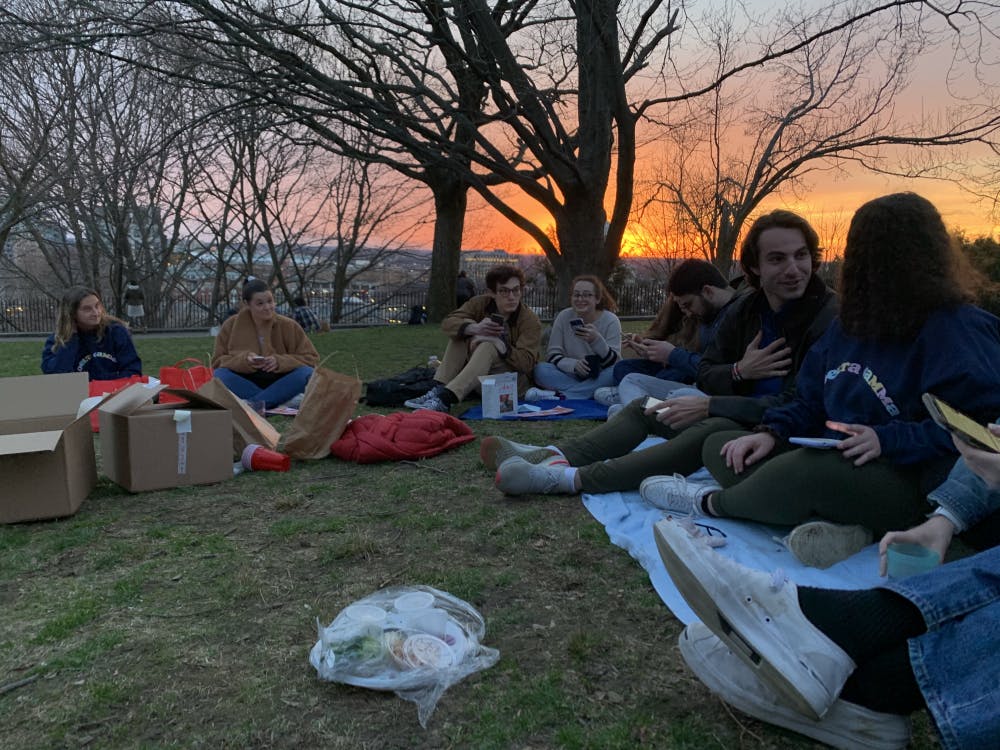With the start of Passover on Saturday night, students across campus have begun to celebrate the holiday with their individual pods, at in-person gatherings through Brown/RISD Hillel and on online Zooms.
Passover is a Jewish holiday “commemorating the Hebrews’ liberation from slavery in Egypt and the ‘passing over’ of the forces of destruction, or the sparing of the firstborn of the Israelites,” according to Encyclopaedia Britannica. The holiday commences with a Seder — a special family dinner — filled with ritual blessings, prayers and a narration of the events of Exodus.
It “is a celebration of liberation,” wrote Rabbi Josh Bolton, executive director of Hillel, in an email to The Herald. “We are asked to consider ourselves as having personally left Egypt.”
Last year’s Passover took place just after students were sent home from campus due to the COVID-19 pandemic. Since then, “we have grappled with worldwide grief and immense changes to our daily lives,” Bolton wrote. “Passover gives us an opportunity to consider the ways in which we have sought liberation during these times of restriction and how we can strive to free ourselves and others as we move forward.”
For many students, Passover has taken on a new meaning this year in light of hardships from the pandemic.
“During the pandemic, Passover puts into perspective the things that are important to me: my family, friends and schoolwork,” wrote Hillel’s Vice President of Social and Cultural Engagement Rebecca Rosenzweig ’23 in an email to The Herald. “I would not have any of these things without the freedom I have in America.”
For many, Passover is usually spent with extended family, with multiple generations often dining under the same roof in celebration. Due to the pandemic, the holiday looked much different this year for students on campus. Restrictions on travel to and from College Hill have made it difficult for most to safely spend the holiday with their families.
“I’ve celebrated Passover with my huge family basically my entire life, minus last year due to COVID,” said Lucy Lebowitz ’24. “It was really different not having my family around at all. We’re vast and really only all together during the holiday, so it was something I always looked forward to.”
Though Hillel has been working with the University to provide Kosher-for-Passover meals during lunch and dinner along with Seder Meals on the first weekend of the holiday, some students found it difficult to keep to the dietary rules of Passover, which prohibit eating any leavened products.
“This year it has been especially hard for me to celebrate Passover by actually keeping it,” said Hannah Julius ’24. “With my family, it’s much easier to have kosher food for every meal, as we are all keeping Passover together and there are typically more food options.”
For others, the absence of meal options connected with being unable to partake in personal family traditions. “It’s hard to imagine what Passover is without your Bubbe’s matzo ball. Without the trappings of the familiar. Without all the little idiosyncratic traditions that families develop over the years,” Bolton wrote.
But students were still able to “lean into this unique year and have fun celebrating Passover differently,” Bolton added.
Many stayed connected with their families over Zoom. After a dinner with her sister, who is a junior at Brown, Nia McGregor ’24 Zoomed with her family at home, she wrote in an email to The Herald.
With Hillel’s “careful planning, creativity and outside-the-box thinking,” students were also able to celebrate on campus, Bolton wrote. The program’s DIY Seder initiative provided hundreds of students with all the necessities of a Seder dinner, encouraging them to celebrate with their pods. There were also multiple virtual Seders hosted for students wanting to connect with the wider Jewish community.
On Saturday, Hillel also hosted an in-person Seder on Pembroke Field for students living in dorms. “It actually did have good and safe numbers, so the night felt slightly closer to normalcy,” Lebowitz said.
Some students hosted private celebrations as well. “For the second Seder, a few friends of mine came to my dorm and we had our own little makeshift mini-celebration,” Lebowitz added. “It was unique in a really fun and exciting way. It’ll definitely be a Passover I’ll never forget, singing ‘Dayenu’ in my dorm with my friends and acting out the plagues with some props. It was a great time.”
Other students used their on-campus celebrations as an opportunity to share their traditions with non-Jewish friends.
“I did a makeshift outdoor Seder with my friends. Most of them there weren’t Jewish, but they were all eager to learn about the traditions of the dinner,” Julius said. “I really enjoyed sharing parts of what my family tradition is with my friends.”
This sense of community is not uncommon among the University’s Jewish students. “I love getting to celebrate Jewish holidays with Jews and non-Jews from all walks of life,” Rosenzweig wrote. “It gives me great joy to be able to share such a special holiday with my friends who may not know that much about it, and also surround myself with others who share similar practices as me.”
Hillel is a campus organization dedicated to fostering an environment where Jewish students, and students of all backgrounds, “can come to be at home, to connect, to seek meaning and to have fun,” Bolton wrote.
“Hillel has done a great job supporting the community,” McGreggor added. “They have done a great job welcoming first-years and making it easy for us to connect with other Jews. All of the staff is amazing and I look forward to every Friday when I pick up my Shabbat meal to talk to whoever is there.”
Hillel still offers Shabbat meals every Friday despite the pandemic, and has continued to provide platforms and events for students to connect virtually.
“I have made lifelong friends who feel like a second family,” Lebowitz said, “and I’m grateful I got to spend my favorite holiday with them.”

Alex Nadirashvili was the managing editor of multimedia and social media for The Brown Daily Herald's 133rd Editorial Board. As a former University News editor, he covered faculty, higher education and student life, though his proudest legacy is The Brown Daily Herald TikTok account.





